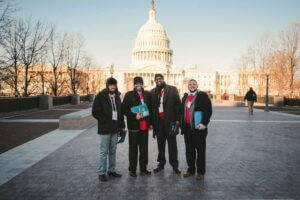In Real Life Blog Series: How Mentoring Helped A Young Woman Form Her Career Path
Mentoring can happen in moments big and small. Think back to the guidance you received from that experienced colleague during critical moments when navigating your career path, and how that relationship empowered you. This July, we’ll share resources, stories and tips that illustrate how you can pay-it-forward through mentoring and help youth build a foundation of knowledge as they embrace their journey to success. This post tells the story of Elizabeth Kaehr and how mentoring helped form her career path.
 Research from MENTOR found that young people who are at risk for not completing high school but have a mentor are far more likely to go to college, participate in positive activities and volunteer in their communities. The benefits of mentoring aren’t restricted to at-risk youth. According to The Deloitte Millennial Survey, one in four Millennials will join a new organization or do something different in the next year. The number spikes to 44 percent over the course of two years. In markets like the United States where Millennials now represent the largest segment of the workforce, this ease of changing employers or direction presents serious hiring and retaining challenges. Mentoring can help address these challenge.
Research from MENTOR found that young people who are at risk for not completing high school but have a mentor are far more likely to go to college, participate in positive activities and volunteer in their communities. The benefits of mentoring aren’t restricted to at-risk youth. According to The Deloitte Millennial Survey, one in four Millennials will join a new organization or do something different in the next year. The number spikes to 44 percent over the course of two years. In markets like the United States where Millennials now represent the largest segment of the workforce, this ease of changing employers or direction presents serious hiring and retaining challenges. Mentoring can help address these challenge.
Once relegated to corporate boardrooms and human resources departments, formal mentorships are becoming powerful recruiting tools for companies seeking to hire (and retain) Millennialls in careers such as manufacturing or other positions they never would have considered had they not had a mentor.
It worked for Elizabeth Kaehr.
Elizabeth Kaehr, 20, says she was grateful to not only have one mentor, but several, during her recent internship. Kaehr is among several students at Bellingham Technical College (BTC) in Bellingham, Washington, who is participating in a global internship program designed to introduce unemployed youth to manufacturing careers supported by Alcoa Foundation. Kaehr is graduating from BTC in June with an Associate Applied Science (AAS) degree in Process Technology with plans to transfer to Western Washington University. Realizing that she needed 10 internship credits for her degree, she applied and was accepted for a paid internship through the City of Lynden, working in a waste and water treatment plant.
 “I was lucky enough to work with every single employee there and learn about their skills, and their education, which was incredible,” says Kaehr.
“I was lucky enough to work with every single employee there and learn about their skills, and their education, which was incredible,” says Kaehr.
During her time, she learned how to collect water samples from the Darigold plant, did pressure washing, gained knowledge on how to produce compost, clean out pump stations throughout the city, clean out sedimentation basins, as well as retrieve and test samples (TSS and BOD).
“This internship definitely encouraged me to further my education in the water and wastewater industry, which I am extremely excited to do,” says Kaehr.
Kaehr was thoughtful in choosing an internship that allowed her not only to learn several workplace skills that she’d need to succeed in the industry but would also provide her with a real-world understanding of what it means to work in this type of environment.
Her mentors were an integral part of the process and she wishes more interns would see their experience as a “huge opportunity to gain so much knowledge from someone who truly wants to see you succeed.”
When asked how this internship can benefit other interns, she didn’t focus the on-the-job skills she learned or where she was hoping to use those skills next. She stressed the value the connections that she made.
The relationships she developed through her internship, she says, are what will help her advance in her career. The people she’s met through the internship will be among those who can help her secure a job right after the internship ends, lead to a future job opportunity or equip her with skills she can’t learn in school.
It’s important to note that mentoring doesn’t just benefit the mentee. Mentors have active roles and gain just as much as mentees. They get the benefit of sharing their knowledge with youth eager to learn how to tackle issues in a way they might not have considered.
Kaehr credits her internship experience and mentors for helping her make some hard career decisions. She’s grateful that the internship site was a smaller plant that provided her with more access to mentors who really cared about her learning and growth as well as gave her the freedom to participate in various activities. It also allowed her to expand her knowledge base of the industry as a whole, something, she says has been invaluable. Her mentors opened her eyes beyond the technical skills required, which is something that she will carry with her while she continues her professional development.
###
9 million young people in America are in need of a trusted adult in their lives to guide them in moments big and small. Join the In Real Life movement and become an advocate, make a donation or become a volunteer.


